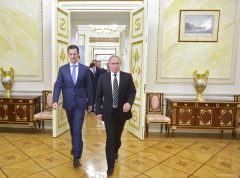EURUS Professor Piotr Dutkiewicz has co-publisheda paper with Dr. Nikolay Kozhanov entitled “Civil War in Syria and the Evolution of Russian – Iranian Relations”. The research paper can be found here, and a summary is included below:

Russian President Vladimir Putin (R) and Syrian President Bashar al-Assad enter a hall during a meeting at the Kremlin in Moscow, Russia, October 20, 2015. Picture taken October 20, 2015. REUTERS/Alexei Druzhinin/RIA Novosti/Kremlin
The current level of confrontation between Russia and the West—unprecedented since the end of the Cold War—has resulted in Russia’s pursuit of strengthened ties with many Middle Eastern countries. A series of “strategic” and “tactical” factors determined the escalation of Russia’s involvement in Syria from its role as a supplier of military hardware and political support, to its direct military intervention in the civil war and war against the ISIL. Amongst the strategic factors, the most important was the Russian elite’s intention to break the “strategic deadlock” that kept Russia subordinated to “western rules and domination” that were diminishing and constraining Moscow’s use of sovereign power domestically and internationally. A set of tactical factors includes a mix of geopolitical, military-industrial, economic and ideological drivers such as Russia’s belief in the necessity of avoiding the collapse of a friendly regime; the protection of Russia’s national security; the importance of preventing Muslim radicalism from destabilizing the region; challenging current regimes in the post-Soviet space and—to a certain extent-challenging the West.
Moscow’s involvement in the Syrian conflict had a direct impact on Russian relations with the Middle East. Specifically, it created a solid base for the development of Russian cooperation with Iran. Currently, Moscow and Tehran formed a marriage of convenience in Syria where each partner tries to reach its own goals through joint efforts. However this form of cooperation does not exclude the possibility of future rifts between the two countries.
Moscow’s engagement in Syria also added a new layer of contact, coordination and cooperation between Russia and Israel. This, in turn, resulted in the upgrade of Russian-Israeli ties to a “special relations” status. The harsh reaction from a large part of the Middle East to Russia’s military involvement in Syria compelled Moscow to intensify its attempts to bring some of the Arab countries onto the Russian side in order to dilute the emerging anti-Russian camp in the region. Subsequently, the Kremlin found support in Egypt. Cairo not only praised Moscow’s actions in Syria but also became actively involved in the process of the revitalization of the diplomatic track of the Syrian crisis settlement.
Moscow’s intensified involvement in the regional affairs can also have a direct influence on Russian relations with the Gulf Cooperation Council (GCC) countries. After a few years of minimal contact, a combination of power shifts, new security threats in the Middle East, and a shift in GCC foreign policies that became slightly less allied with the US, contributed to a recent boost in Russian–Saudi relations with repercussions for other GCC members